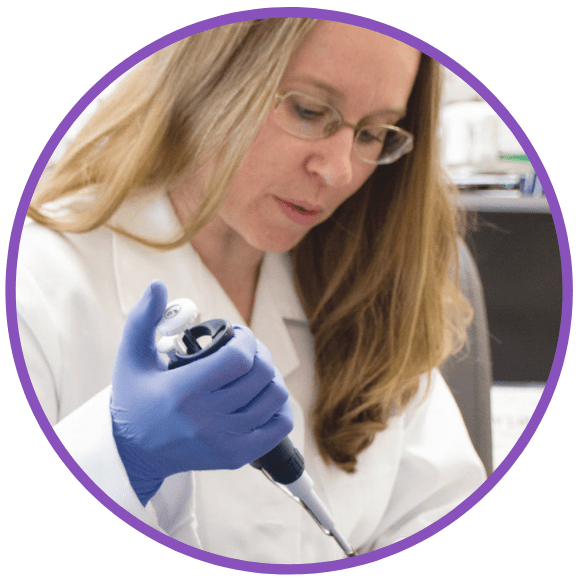Sylvie Garneau-Tsodikova: overcoming resistance to antibiotics and women in STEM

Following on from Sylvie Garneau-Tsodikova’s fascinating contribution to our #TalkIWD20 twitter chat, we catch up with Sylvie to discuss her research into antibiotic resistance and to delve further into some of the issues she raised during the twitter chat.
Please can you introduce yourself and your institution?
 My name is Sylvie Garneau-Tsodikova. I am a Professor of Pharmaceutical Sciences and Assistant Dean for Research in the College of Pharmacy at the University of Kentucky (KY, USA). The College of Pharmacy in the University of Kentucky is very highly ranked in the USA, and I feel very fortunate to be working in such a great environment.
My name is Sylvie Garneau-Tsodikova. I am a Professor of Pharmaceutical Sciences and Assistant Dean for Research in the College of Pharmacy at the University of Kentucky (KY, USA). The College of Pharmacy in the University of Kentucky is very highly ranked in the USA, and I feel very fortunate to be working in such a great environment.
I have a passion for science, outreach and gender equality. I also have a passion for art, which has equally nothing to do with science and everything to do with science.
Can you tell us about your current research and what you’re finding particularly exciting?
I have a strong interest in infectious diseases, and this is also the focus of my laboratory. I trained as a chemist during my PhD at the University of Alberta (AB, Canada) and from there I moved to Harvard Medical School (MA, USA), where I studied mechanistic enzymology. My team is, therefore, comprised of chemists, biochemists and microbiologists and our main focus is on discovering and developing antibacterial and antifungal agents.
We do everything including designing molecules, synthesizing molecules, testing them against bacterial and fungal pathogens and then optimizing them. We have almost every bacterial and fungal pathogen you could imagine in my lab! When we get to the animal stage we collaborate with different people whose expertise are not in my skill set. We cannot do it all alone. My lab is highly collaborative, and I have a nice set of collaborators.
One of our focus diseases is tuberculosis. Tuberculosis is a lung disease that kills millions of people each year and although it is not a big problem in the U.S. where I am located, for me, humans are humans and we need to help everybody on the planet. I don’t necessarily always look for problems that are in my backyard, I look for global problems to try to solve.
In the past 6-7 years, we’ve started working on antifungal resistance and specifically working towards trying to combat the deadly Candida auris resistant pathogen. Those are some of the main pathogens that we work on, but we also look at all different fungal and bacterial pathogens that are difficult to treat due to resistance. Resistance is an ever-growing problem and that’s what we are trying to combat.
We also develop new tools in chemistry, such as multifunctional enzymes. These are enzymes that can perform two or three functions and could help to accelerate or improve the drug discovery process.
How are you exploring the application of these multifunctional enzymes? As potential antimicrobials?
We are not using the enzymes as potential antimicrobials themselves, but the enzymes that we are developing come from an assembly of enzymes that create natural products and have different biological properties including being anti-cancer, antibacterial and anti-anything else you can imagine. So, natural products are a treasure trove for drug discovery!
We take these enzymes and we modify them so that we can either use them in conjunction with chemistry or reinsert them in different bacteria so that they can make new products.
Where do you most frequently face challenges in your research and what are those challenges?
Early in my career, back in 2006, I became an Assistant Professor at the University of Michigan (MI, USA). At that time people didn’t seem to realize the problem that antibiotic or antimicrobial agent resistance was going to become. Therefore, funding for this type of research was not prominent. I was even once told by someone that by working on this, I was probably killing my career. This made me question whether I was doing the right thing, but deep down in my heart, I knew that at some point in time, we would have to wake up as a society and as scientists, and see that bacteria and fungi are winning the battle and we need to do something.
For this reason, I decided to stick with what I believed in and what I was passionate about. This could have been a risk that didn’t pay off, and this person could have been right, but I am here today, working on a topic that’s really important in society. If you are convinced that you have a scientific problem that is worth pursuing and you are passionate about it, don’t let people discourage you and just keep on pursuing what you believe in.
Developing antimicrobial agents is a slow process and there are always challenges at every step meaning you have to go back, but that’s part of research! It’s called research for a reason, we search and then we search again, and again, and so on. Therefore, I don’t see that as a challenge. However, a lot of the big pharmaceutical companies have gotten in and out of antimicrobial agents because it is not as lucrative for them as other types of ailments, where people have to take a drug every day for the rest of their lives. Nonetheless, these are still super important to do.
 Targeting obesity and the 2020 Queensland Women in STEM award with Denuja Karunakaran
Targeting obesity and the 2020 Queensland Women in STEM award with Denuja Karunakaran
Denuja Karunakaran to discusses her entry to the 2020 Queensland Women in STEM award, her research into the genetics of obesity and the challenges she has faced, and overcome, as a woman in STEM.
If you could ask for one particular thing that would help you in your fight against antimicrobial resistance, what would it be?
I would ask for better education at all stages. Kids need to learn very early on about infectious diseases, not in a scary way but in a way where that they can understand and even educate their parents. Since I believe in children’s education and the importance of exposing them to STEM in general, I have started an outreach program called SciCats, which stands for Science Cultivates Academically Talented Students. We go to schools to do hands-on experiments. It’s not always related to antibiotic resistance, most often it actually is not as we follow the state curriculum, but I think it’s important to get the kids excited about research and STEM in general.
However, it is not just children who need this, the general public also needs to be better educated on the issues. Far too often, people take antibiotics when they don’t need them. We need to educate them that antibiotics don’t work against viruses and about the importance of taking your antibiotics when you do need them. I think we also need to educate prescribers and need better prescription policies because there is an over-prescription of antibiotics that is not helping the antibiotic crisis.
Other than this, we also need better and faster diagnostic tools as if we can diagnose faster and more accurately, there will be a lower chance of antibiotics being prescribed when they are not needed, or the wrong antibiotics being prescribed.
Furthermore, these tools need to be fully accessible and affordable to all. If you are in a big city and you have a big medical center, they will likely have the tools needed. However, the problem arises in rural areas and countries that don’t have the same money and facilities and, therefore, do not have the same access.
Can you tell us about the IF/THEN Ambassador Program?
This year, I was very fortunate and blessed, to be selected as an American Association for the Advancement of Science (AAAS; Washington DC, USA) IF/THEN Ambassador. The AAAS and Lyda Hill Philanthropies (TX, USA) selected a group of 125 women to serve as STEM role models, to change the narrative in STEM and help inspire young girls to pursue STEM careers, and I am one of them! I feel so overwhelmed and overjoyed that I was selected to be one of these women! The program is comprised of women from different STEM careers, at different stages of their careers, and the main goal is to show young girls that they can be whoever they want to be.
I believe if you give a girl the right tools, then she can conquer the world. We say “IF she can see it, THEN she can be it,” right? If they don’t see a role model doing a career that they are considering, it’s harder for them to believe they can do it. Therefore, this IF/THEN Ambassador program is something pretty extraordinary and I think we need more of these programs and more people investing in providing young girls with positive role models.
During our previous summit (21-25 October 2019, Dallas, TX, USA), IF/THEN did a 3D full body scan of all of us as they realized that there were almost no statues of women in the world and, specifically, in the U.S. There is going to be an exposition scheduled to open May 1st, in Dallas, with full-sized statues of over 120 of us, showing who we are and what we do, so that people can see real women in STEM.
Two women making waves in STEM discuss their recent work developing deep learning algorithms to improve research for stage IV non-small cell lung cancer patients.
Have you ever faced challenges as a result of attitudes towards women in STEM roles and, if you so, how have you dealt with those challenges?
I have been a pretty blessed person in life. I have had mentors, although I call them my little angels, that have helped me along the way. So, some of the challenges that I see daily are not necessarily applicable to me. However, there are areas that I think need to be improved on, for instance, equal pay for equal work is still an issue. In some cases, women are doing more work and receiving less pay. This is something that is prominent in many countries, even in the U.S.
Another issue is the stereotypes that surround women. People say that “women are too emotional; they cannot become leaders.” I think that being overemotional can be negative, but being emotional is also something that should be valued. It’s important to lead teams with compassion and love.
People think that women are too distracted once they have children, that if a woman has a family, they cannot grow in a STEM career – this isn’t true. I think this is a big challenge and we need more opportunities for women who are mothers – especially single mothers – to have facilities at work and accommodations at conferences and meetings. These are real problems. I love kids, that’s why I do outreach, I think kids are really important. Unfortunately, if you have kids people say, ”women with a family are too distracted.” Now, if you take a woman who doesn’t have children, then people ask, ”what’s wrong? Why doesn’t she have kids?” It feels like there is no way to win right now. I think you can only be yourself and I that we need to help those who have children by providing the necessary accommodations. We need to come up with more inclusive work environments.
I was in Brazil, at the BrazMedChem meeting, on the panel for women in science. I started speaking, and I heard a baby cry in the room. It made me tear up and become emotional. I was so happy to see that nobody flinched or reacted negatively. The baby was crying and the woman stayed there, and I was so happy to see that people were welcoming of a young mother, we need more of this; we need women to be able to bring their babies to conferences.
Another issue to address is that often people don’t mentor women to become leaders, I don’t think this is necessarily intentional, but there is an unconscious bias that you train men to be leaders. I am lucky that my school and my superiors are very supportive and are helping me to develop as a leader. This year, the Dean of my College, Dean Kip Guy, is supporting me to be a part of two leadership programs: The American Association of Colleges of Pharmacy (AACP) Academic Leadership Fellows Program (ALFP) and the 2020 Bluegrass Higher Education Consortium Academic Leadership Academy (ALA). I have already been able to put some of the leadership skills I learned into use in response to COVID-19.
Do you have any advice for women in STEM?
The advice that I would give is, in your early career, make sure you find mentors. I was scared of seeking mentors because I thought I needed to do it all by myself when I was younger and now I seek mentors for everything that I want to achieve. I realized that the more people accomplish in life, the more they are willing to help you. So, don’t be intimidated to seek mentors.
I think that another thing that I’d tell young women is to help other women, promote them, even if they are at the same stage of career. I think we are stronger together and we need to work together to give women a platform and a voice.
I want to thank you for giving me this opportunity today to have a platform and a voice. I think that we need not only the governments, the companies, academia, but everybody needs to invest more money to help increase not only gender equality but diversity equality, because we cannot do great science if we don’t have a diverse group of people working together, diversity brings different perspectives.
You have mentioned your passion for art, how does this impact your research?
My research is art. It started at an early age when I was a ballerina and also played piano. I think that both these things give you discipline and you need discipline for science. It gives you resilience because you don’t get movement to be perfected in a minute, just like you don’t get your antibiotics to be perfect on the first trial.
I love the beauty of art, I love painting, I love creating music, I love creating choreography and movement, and to me molecules dance together to create new molecules. I like paintings, so when I make figures for an article, they must be artistic, of course they are accurate and they are real data, but they need to be presented in a way that will be appealing to the reader.
You need to be creative in art, you also need to be creative if you want to create new antibiotics. You need to be creative if you want to come up with ideas that nobody has ever come up with. So, arts and science to me are essentially the same. I still paint, I still play piano, I still dance, but science is another way for me to express my artistic side.
One thing that I want children and young women to realize is not to separate their passions, not to say, ‘oh, at home I like this and at work I like this.’ Combine your passions, because you’ve only got one life, you are one person, and you should be one fully involved person in all aspects of your life. So, if you can find a career that combines your passions, you’ll never feel like you worked a day in your life. You’ll always just be happy, because you are doing what you love. And that’s what I wish for all my students and all my fellow human beings.
To find out more about Sylvie, you can visit her YouTube channel and watch her video: Who I am, What I do, and Why I do it
 Liesbeth Hondelink and Reidunn Jetne Edelmann on deep learning for cancer research and early career advice for women in STEM
Liesbeth Hondelink and Reidunn Jetne Edelmann on deep learning for cancer research and early career advice for women in STEM